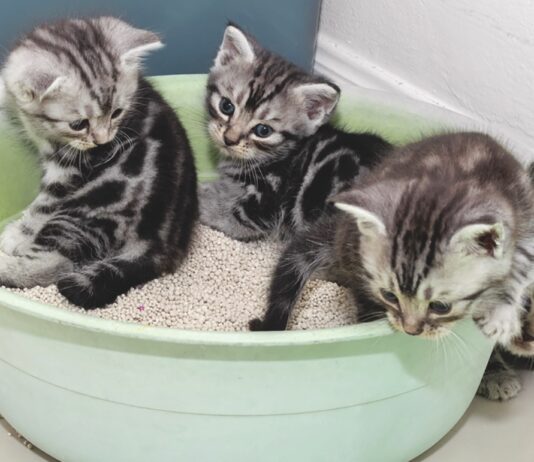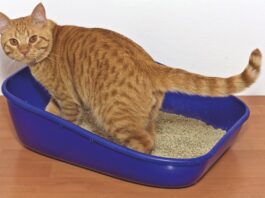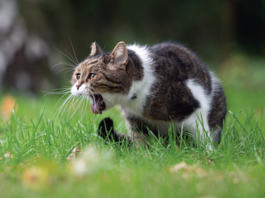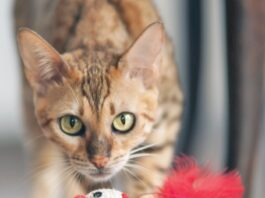Ask Elizabeth: September 2012
I work at a large no-kill animal sanctuary with special-needs cats. Often when one becomes ill and stops eating, we tempt him or her with people food like baby food or boiled chicken. I have heard a lot of conflicting things about feeding cats baby food or straight meat. Someone recently told me that a good all-meat baby food and straight chicken are nutritionally complete, but I have read in a few places that cats need other nutrients like taurine and vitamins A and D or they will get very sick. Does straight meat provide full nutrition for cats? In the wild, how do cats get full nutrition if meat does not provide it all? What is the best kind of food for our dear kitties?
Ask Elizabeth: July 2012
Dear Elizabeth: We adopted a new kitten from a local rescue group last month, and she is just perfect. Although she had been tested for the leukemia virus and FIV by the terrific group that saved her from the street, we took her to our veterinarian right away so that she could be examined before we introduced her to our two older cats. After a clean bill of health, we brought Bunny home, and she has become part of the family. The problem is that before we scheduled her spay surgery, she came into heat. What a scene!
Ask Elizabeth: June 2012
Aromatherapy, for readers who may not be acquainted with the term, is the practice of releasing the essences of various botanicals into the air for beneficial effects. Some essences are utilized as a form of alternative medicine and are said to ease pain, diminish inflammation, fight infection and reduce stress, among other things. Other essences are used, as is the case for you and your wife, for aesthetic purposes because they smell good. While the medicinal value of aromatherapy is debatable (and contested by some medical experts), there is no doubt that any household can get a pleasant boost from such delightful fragrances.
Ask Elizabeth: May 2012
I’m hoping that you can help me solve a very frustrating problem. My cat Jessica is a six-year-old Siamese. Her skin has become very dry and flakey, and I think it must be very itchy. She’s constantly scratching at herself, sometimes so roughly that little clumps of her coat fall out. I haven’t taken her to see a veterinarian yet, but a neighbor told me that I should be giving Jessica omega-3 supplements. But omega-3 comes from fish oil, and I think that Jessica is allergic to fish, so I’m afraid to do that. Are there any other sources of omega-3? What other ingredients in her food could be making her so uncomfortable?
Ask Elizabeth: April 2012
Dear Elizabeth: Last summer, my husband and I became the proud keepers of Miss Looci, a four-week-old rescue cat. She’s a lovely, strictly indoor cat — long-haired and pure black. Since she’s been with us, Looci has become my home-bound husband’s constant companion, and she’s become quite big and strong. We love her, and she gets plenty of attention. But here’s our problem: Looci has the habit of suddenly biting me, my husband or our guests while she’s being petted. Why does she do this, and how can we stop her?
Ask Elizabeth: March 2012
Female cats in heat can be quite promiscuous and will often mate with more than one male, a survival mechanism designed to increase the chances that mating will result in pregnancy. Studies show cats that mate only once get pregnant just 50 percent of the time. Cats are induced ovulators, meaning that the act of mating triggers egg release or ovulation. When cats ovulate, multiple eggs are usually released. Not all of the eggs are necessarily fertilized following a mating. Unfertilized eggs can be fertilized during a subsequent mating, or the next mating may result in the release of even more eggs which are then available for fertilization.
Ask Elizabeth: February 2012
Dear Elizabeth: Help! My cat Decker’s yowling is keeping me awake at night. I have become truly desperate for a good night’s sleep! - I can certainly sympathize with your need for sleep. Decker may be keeping you awake at night due to medical or behavioral reasons. Without more background information, I don’t know which is likely to be responsible in your case, so I’ll discuss several possibilities in the hopes that I hit upon the cause behind Decker’s insomnia. In the meantime, you should schedule an appointment with your veterinarian.
Ask Elizabeth: January 2012
We adopted a new kitten from a local rescue group last month, and she is just perfect. Although she had been tested for the feline leukemia virus and FIV by the terrific group that saved her from the street, we took her to our veterinarian right away so that she could be examined before we introduced her to our two older cats. After a clean bill of health, we brought Bunny home, and she has become a well-integrated part of the family. The problem is that before we scheduled her spay surgery, she came into heat. What a scene!
Ask Elizabeth: December 2011
Dear Elizabeth: I have a five-year-old indoor cat, Baby, with whom I’ve shared my home ever since she was born. I’ve never had any other companion animals, so it’s been just Baby and me for all that time. Here’s my problem: I recently became engaged and at some point in the near future will be moving into my fiance’s home. He has two cats — both females. One is just about Baby’s age and the other is probably about seven years old. Neither one of them is very friendly. Naturally, I’m concerned about moving Baby into this new environment. I’m afraid that the animals will fight and hurt each other. I’ll appreciate any advice on how I can best address this dilemma.
Ask Elizabeth: November 2011
Dear Elizabeth: Our seven-year-old female cat Queenie is a spayed, well-behaved Siamese who is never allowed outside. However, there are several free-roaming outdoor cats in the neighborhood, and they have become a real nuisance. About six months ago, my husband and I started smelling evidence that the front of our house and our doors were being scent-marked. The odor of urine is quite noticeable and unpleasant for us and also seems to agitate Queenie. We’ve thought about putting some sort of repellent outside, but we don’t want to use anything that could harm these neighborhood cats or wildlife. Do you have any recommendations? What can we do to stop — or at least discourage — these cats from scent-marking our house?
Ask Elizabeth: October 2011
Our 11-year-old cat, Abby, is recovering nicely from a recent bout of cystitis. As part of her recovery, our veterinarian recommended that she be encouraged to take in more liquids. At his suggestion, we now place clean water bowls on every floor of our house — and Abby drinks from all of them throughout the day. The veterinarian also suggested that we add some chicken broth to her canned and dry food to make it more appealing. So I got into the habit of preparing a nice kettle of clear broth, which I then freeze in an ice cube tray.
Ask Elizabeth: September 2011
Dear Elizabeth: My cat, Couscous, is 15 years old, and I know that I won’t have her here with me forever. I can’t imagine life without her dainty little paws brushing against my face in the morning as she wakes me for breakfast, or the warm, happy mews that she greets me with each time I walk in the door. I read about a company that was cloning cats. How does cloning work, and is this something that I could consider to ensure that Couscous will always be with me?










